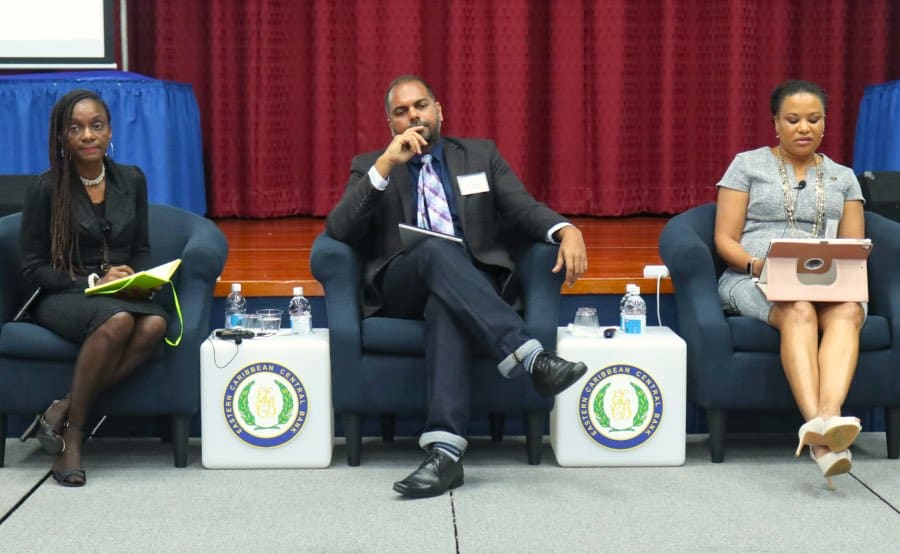
Above: Sybil Welsh, ECCB, Shiva Bissessar, Pinaka Consulting Ltd and Ms Donna Wellington, First Caribbean International Bank (Barbados). Photo courtesy ECCB.
Financial Innovation & Inclusion in ECCU
Speaking notes from a presentation delivered by Mr Shiva Bissessar at Eastern Caribbean Central Bank (ECCB) 29th Annual Conference with Commercial Banks; 8th November 2018.
First we must define what is cashless.
Payment card
There are varying levels of adoption of payment cards within the Caribbean and all economies claim to be cash intensive. A 2015 World Bank report cites purchases in Guyana, attributable to cash, having a frequency of over 99%.
One commercial banker recently described that there is a lot of innovation they would like to bring within payment card products but the banks, and VISA and Mastercard themselves, are acutely aware that cash is the main competition.
Many agree that governments can serve as a catalyst in this area by; ensuring appropriate legislation is passed, offering electronic channels for payment themselves and incentivizing increased adoption of plastic.
Financial exclusion
To access payment cards require that you be a client of a bank, however, the procedures used for on-boarding of customers has been an issue given the varied interpretation of Financial Actions Task Force’s Anti-Money Laundering and Combat Financial Terrorism (AML/CTF) guidelines and subsequent development of, what some would deem to be, onerous KYC (Know your customer) requirements by banks.
This is a result of the ongoing Correspondent Bank de-risking challenge as fuelled by the perception of risk of doing business in the Caribbean.
The knock-on effect, however, is the potential for financial exclusion to take place as persons who should qualify for banking services are faced with requirements for identification or proof of address which they cannot meet.
Advocating for a more risk-based approach towards customer onboarding may be required in the hope of stemming the tide of financial exclusion.
Mobile Financial Services
Mobile banking eventually results in the movement of cash between bank accounts to facilitate transactions. This differs from mobile money which involves the actual movement of some token of value between mobile wallets.
We all know of the success of M-PESA in Kenya where a telecom’s airtime was initially used as the mechanism of transfer to facilitate transactions which subsequently developed into a formal product. In Guyana, similar to M-PESA, a no objection letter was issued by the Bank of Guyana which allowed GTT to create their mobile money product; however, user adoption issues may exist.
The concept of a wallet as actually holding value is something which may need further definition within regional territories.
Digital Currency
Fintech has created payment products which utilize digital currency as the mechanism of transfer between parties to facilitate transactions. In the Philippines, authorities allowed innovation to flourish permitting providers to develop remittance products utilizing digital currency and eventually ‘caught up,’ creating classifications for these products to allow for oversight purpose.
The CBTT has announced that is currently developing its e-money and virtual currency policies which would potentially allow Fintech to bring to market a wider set of officially recognized products and services.
Digital Fiat Currency
A central bank issued Digital Currency (CBDC) or Digital Fiat Currency (DFC) is currently engaging the attention of central bank authorities globally. The Bank of England, Monetary Authority in Singapore and Bank of Canada have all published research in this area, with the latter two publishing their research into CBDC in the wholesale space.
Several central banks including those on China, Brazil and Sweden, are in various stages of development of their research into DFC in the retail payment space; that is, to be used by normal members of the public in the everyday transactions.
Right here in the Caribbean, the Bank of Bahamas recently invited responses within an open Expressions of Interest exercise inviting submissions on DFC while the ECCB has announced a DFC pilot with service provider.
So the question is; what version of cashless do we promote?
In consideration of DFC…
-
Defining problem & solution – Representatives of the Fed Reserve in NY opine that a CBDC (Central Bank issued Digital Currency) needs to solve some problem; hence the problem and how we intend to solve it requires clear articulation.
-
Address policy, legislation & regulation issues. In Sweden, their current approach is centred on analysis of legal and policy issues surrounding the introduction of a DFC in the retail space following which they are to decide in 2019 on moving forward with further research or actual development of DFC or end their exploration.
-
Inclusivity – In Brazil, they are advocating for involvement of a wide range of specialists and consolidation of knowledge in the field.
In consideration of development of the various form of ‘cashless’ an enabling regulatory environment to support innovation is required. The level of anonymity within a DFC is a critical concern of consumers and other key stakeholders, hence extensive consultation is required.
Security & Privacy concerns…
-
What information security standards are adopted by our territories?
-
From a software development perspective, do we have the capacity and depth of expertise to create secure mobile payment apps?
-
Do we have the discipline required for data privacy?
-
Do we have the supporting policy, legislation required?
Shiva Bissessar is the Managing Director & Principal Consultant of Pinaka Consulting Ltd. He has provided professional services to Caribbean Fintechs and Telcos as well as UN ECLAC and the ITU in the area of Digital Financial Services.
He recently served as a program committee member for the Blockchain Research and Application session at the IEEE 2018 World Congress on Computational Intelligence (WCCI). At present he is a senior consultant on an EU funded project examining how digital payments can benefit MSMEs within six Caribbean territories.



FATF’s AML/CTF?
Fixed.